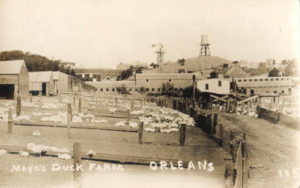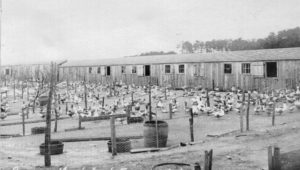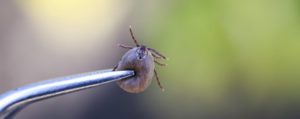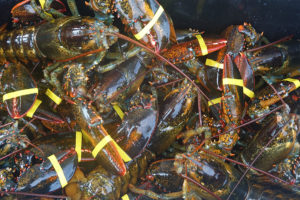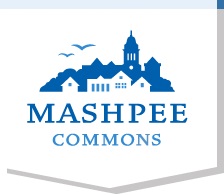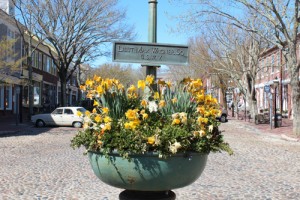Cape Cod at the turn of the 20th century was a far different place than today. There were no paved roads, barely any electricity, no shopping centers, and possibly the most successful business enterprise on the entire Cape was a farm. Not just an ordinary farm, a duck farm. This is the story of Mayo’s Duck Farm of Orleans.
The legendary duck farm got its start through the vision of Walter H. Mayo of East Orleans. At the end of the 19th century Mayo had been working as a clerk at the Cummings-Howes store and had bigger plans. He began his new venture in 1895 raising a few chickens using an asparagus field across the street from his father’s home among the hills of Nauset Heights. It was called the Nauset Poultry Farm. The farm was a basic and rudimentary beginning for Mayo with his only true means of incubating the chicken eggs being setting hens, meaning one puts the eggs close to a hen and letting her be the incubator. The first few years saw Mayo working part-time on his poultry raising project while spending the summer helping his parents’ who took in boarders at their home and helping on his parents’ general farm during the off-season.
Despite his vision the first few years were rough on Mayo due to a lack of funds and difficulty in marketing his new business. Mayo would later state that he began his venture on capital of only fifty cents which he used to buy a dozen duck eggs. He persevered though and began to gain footing raising more chickens and adding ducks to his project. In 1901 he made his way to Boston with 3,000 ducks for sale, word began to spread about the fledgling fowl farm situated in East Orleans. In the years that followed the success of selling the ducks in Boston led Mayo to transition his farm mainly to ducks.
Building on his initial success Mayo increased his number of ducks throughout the 1910’s reaching over 40,000 in the early 1920’s. Mayo specialized in raising the White Peking duck popular for its fine flavored meat and the short length of time it took to reach market size. The ducks took only eight weeks to reach the desired size of five to six pounds. These ducks would be shipped as far away as Maryland, Delaware, and Virginia however they were quite popular with summer Cape Cod residents as well. The one hundred acre farm would in 1946 peak with 750,000 ducks raised in a year and 64,000 chickens. There were so many birds on Mayo’s farm that children could actually rent a chicken for the summer, on the condition they returned it after the summer ended of course.
The duck farm was long and hard work for Walter Mayo, with most days beginning at 4am and lasting well past sundown, especially in the days before the automation of equipment. Eggs in the incubators would have to be turned by hand, thousands at a time. There was also processing and packing the sold ducks in ice to be shipped from Orleans nightly via railroad. However despite all of the long days Mayo remained friendly and popular among his growing crew of employees as well as the countless visitors who came to the farm to purchase fresh ducks, chickens, or eggs. Even the duck feathers were sold, up to 4,000 pounds per year.
Mayo’s farm was self-sustaining, with its own water and power supplies. The incubating equipment became automated, powered by electricity, allowing the twenty-right incubators to hatch 20,000 to 30,000 birds per week. Mayo’s Duck Farm had become an institution in Orleans by the middle of the 20th century, for a time it was the only year-round industry in town. It had gone from one man’s dream to a place which employed thirty-five people.
The trajectory of Mayo’s Duck Farm changed drastically February 9, 1951 when owner Walter H. Mayo died suddenly at the age of seventy-eight. Walter’s son, Walter Jr. and his wife Barbara kept the family tradition going throughout the 1950’s. In 1952 a shop for selling poultry and eggs was built at the edge of the farm on Beach Road. It would expand to sell hot food like chicken and duck sandwiches and later be named Mayo Farm Kitchen. It would be run by Barbara Mayo and become a success.
Outside forces though were beginning to catch up to the farm. First was the ever-increasing popularity of Cape Cod as a place to live. Land prices began to jump making the one hundred acre farm close to Nauset Beach extremely valuable. Second was the increasing price of grain used to feed the countless thousands of birds on the farm. The successful Mayo Farm Kitchen and catering business run through there as well helped some with making ends meet. In 1967 the Mayos relented and sold off thirty-five acres of the farm which would be developed into Countryside Estates. The following year the farm itself closed leaving only the restaurant running.
In the coming years the Mayos worked hard to make the Mayo Farm Kitchen and an outdoor restaurant called the Quacker a viable business. Though denied a liquor license it was initially a big hit as a lunch spot and bakery. Barbara Mayo’s recipes became a sort of hidden gem on Cape Cod, so much so that in 1971 the bakery sold 500 Thanksgiving pies by 11:30am leaving staff to make 200 more while customers waited. Attempts to enlarge the Quacker were also denied by the town leaving the Mayos in a tight spot where they were successful yet not successful enough to be sustainable.
In 1976 things came to a head financially for Mayo Farm Kitchen and the Quacker. There were plans unveiled again to enlarge the Quacker to a one hundred seat restaurant however they were shelved during the summer. This delay was the death knell and both the Quacker and Mayo Farm Kitchen store were foreclosed upon and Bass River Savings Bank took the land. It was an unceremonious and disappointing end for one of the most successful and popular businesses on Cape Cod for more than half a century. Unfortunately today there is little left of what was once a sprawling duck farm on the way to Nauset Beach beyond photos and memories.
By Christopher Setterlund




